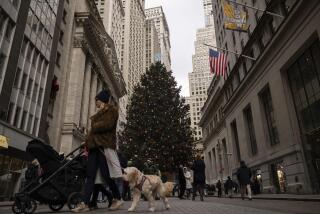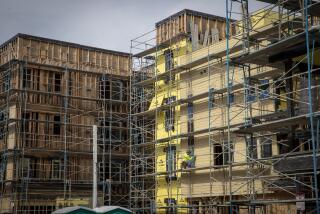Big Banks Hike Prime to 9.5%--2-Year High
- Share via
NEW YORK — Big banks raised their prime lending rate today to the highest level in more than two years, a half-percentage point rise to 9.5%, signaling more expensive loans for consumers and businesses.
It was the second boost in the key lending rate this year and reflected the banks’ own cost of borrowing money, which has been rising steadily over the last few months.
The prime is watched closely because bankers use it as a basis for calculating loans to businesses and for determining many types of fixed and adjustable-rate consumer loans, including popular home-equity loans.
Chase Manhattan Bank in New York was the first to announce the rate increase and was quickly followed by other big banks, including Citibank, First National Bank of Chicago, Bank of New York and Manufacturers Hanover.
Highest Since ’86
The last increase in the prime was on May 11, from 8.5% to 9%. The increase today put the prime at its highest point since March, 1986.
Reaction in the financial markets was muted, partly because a rise had been widely expected. On Wall Street, the Dow Jones average of 30 industrials was up 9.07 an hour before the close.
In the bond market, a sensitive barometer of the economy and interest rate trends, the Treasury’s key 30-year bond was down slightly in price, raising its yield to 9.18% from 9.17% late Wednesday.
The prime rate rise came one day after Federal Reserve Chairman Alan Greenspan warned he would move to tighten credit if inflation started to accelerate.
Testifying in Congress, Greenspan said the Fed “at this juncture might be well advised to err more on the side of restrictiveness rather than stimulus.”
Expected for Weeks
“People have been looking for a prime rate hike for weeks,” said Al Goldman, market strategist with A. G. Edwards & Sons in St. Louis. “Reaction was ho-hum. And even though Greenspan said a discount rate hike was not needed at this time, people are prepared for that as well.”
“It was inevitable--a matter of when, not whether,” said Philip Braverman, chief economist at Irving Securities Corp.
There has been growing evidence that inflation could rise significantly this year. Low unemployment, strains on America’s productive capacities and rising commodity prices caused by the drought point to higher consumer prices in the months ahead.
Many economists have predicted that interest rates would rise slightly this year but do not believe the increase will be dramatic.
More to Read
Inside the business of entertainment
The Wide Shot brings you news, analysis and insights on everything from streaming wars to production — and what it all means for the future.
You may occasionally receive promotional content from the Los Angeles Times.










